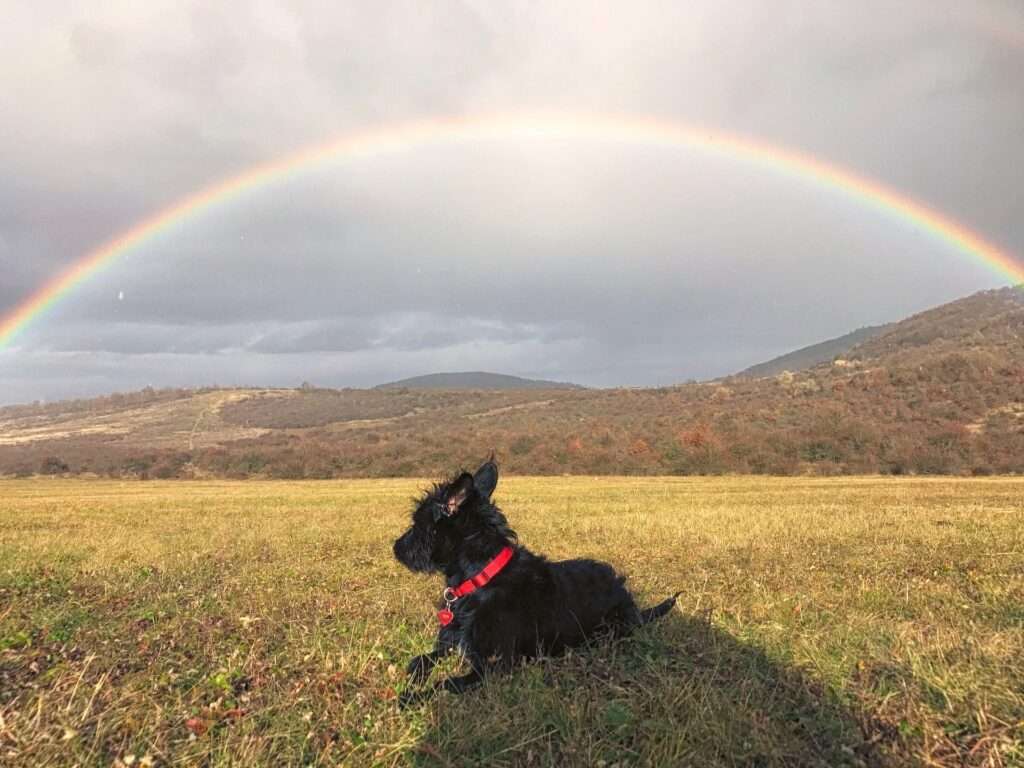Where Do Dogs Go When They Die? Beyond the Rainbow Bridge
Dogs hold a special place in our hearts, often considered cherished family members rather than mere pets. When we experience the loss of a beloved dog, it’s natural to wonder about their fate and where they go when they pass away.
Do dogs go to heaven? This age-old question continues to captivate our thoughts, and while no definitive answer exists, exploring the beliefs and theories surrounding this topic can offer solace and provide insights into the human-canine bond.
In this article, we’ll delve into the depths of the afterlife for dogs, exploring a tapestry of beliefs and perspectives. From the enchanting Rainbow Bridge to the fascinating concept of reincarnation, we embark on a journey to understand where our loyal companions may go when they depart from our lives.
Along the way, we offer practical tips and invaluable resources to help you navigate the grieving process and honor the memory of your beloved pet. Join us as we explore the mysteries, celebrate the memories, and find comfort in the belief that the love we shared with our dogs extends beyond the earthly realm.
Different Beliefs About Where Do Dogs Go When They Die

When we lose our beloved pets, we often find ourselves pondering their destiny beyond this life. The passing of a furry friend can spark curiosity about where they go after death, and understanding the diverse beliefs surrounding this topic can help us find solace during this difficult time. Here are some of the different beliefs regarding where dogs go when they pass away:
- The Rainbow Bridge: A cherished belief among many pet owners is the concept of the Rainbow Bridge. This widely known belief suggests that when a dog leaves this world, they cross a vibrant rainbow bridge to a serene and joyous place. There, they are reunited with other departed dogs, playing and frolicking together for eternity. Originating from a heartfelt poem called “The Rainbow Bridge,” this idea has become a poignant symbol of hope and reunion for those grieving the loss of their furry companions.
- Reincarnation: In certain cultures, the belief in reincarnation extends not only to humans but also to our canine companions. According to this belief, a dog’s soul may be reborn in a new body after they pass away. For pet owners who hold this belief, finding comfort in the possibility of their cherished dog returning to them in a different form can provide solace during the mourning process.
- Religious beliefs: Various religions hold distinct beliefs regarding the afterlife for dogs. For instance, in Hinduism, dogs are considered messengers of the god Yama and are sometimes associated with the afterlife. In Islam, dogs are generally not believed to possess souls, although some scholars suggest that dogs may receive rewards in the afterlife for their loyal service to their human companions. These religious perspectives offer unique insights into the fate of dogs after death, influenced by rich cultural traditions.
While the specific beliefs may vary, these notions all share a common thread: the idea that our dogs continue to exist in some form beyond the physical realm. These beliefs can provide comfort and serve as a reminder that the bonds we forge with our cherished pets transcend this earthly life.
Scientific Perspectives on the Afterlife for Dogs
While faith and spirituality often shape our beliefs about the afterlife for dogs, some may wonder if scientific perspectives can shed light on this subject. While there is no definitive scientific evidence to support the existence of an afterlife for dogs, certain scientific viewpoints offer intriguing insights:
- Consciousness: The question of whether dogs possess consciousness is a captivating area of exploration. While it is challenging to provide conclusive proof, many scientists believe that dogs do exhibit signs of consciousness. For instance, studies published in the journal Animal Cognition have revealed that dogs can experience emotions such as empathy, pride, and jealousy. These findings suggest that dogs may have subjective experiences and a level of awareness.
- Near-death experiences: Some individuals who have had near-death experiences report encountering their departed pets, implying that our furry friends may persist in some form after death. While these experiences are difficult to scientifically study, they can offer solace to pet owners who hold the belief that their dogs await them in the afterlife, ready for a joyful reunion.
- The nature of death: It is essential to contemplate the concept of death itself. While it is commonly viewed as an end, some scientists propose that death may merely signify a transition to a different state of existence. Renowned physicist Max Planck once expressed his perspective, stating, “I regard consciousness as fundamental… I regard matter as derivative from consciousness.” This viewpoint suggests that consciousness may endure beyond the physical body, opening the possibility of an afterlife.
Although these scientific viewpoints do not provide concrete proof of an afterlife for dogs, they raise intriguing questions about the nature of consciousness and the boundaries of existence. As our understanding of these complex topics evolves, we continue to explore the mysteries surrounding the fate of our cherished canine companions.
Coping with the Loss of a Beloved Dog

The loss of a dog can be an immensely challenging ordeal, and it’s crucial to allow yourself time to grieve and cope with your emotions. Here are some tips for coping with the loss of a beloved pet:
- Allow yourself to grieve: The bond between a dog and their owner is unique and profound, so it’s natural to experience a wide range of emotions when you lose your furry friend. Allow yourself to feel the sadness, grief, and any other emotions that arise. Give yourself permission to mourn and process your feelings at your own pace.
- Seek support: Sharing your feelings with understanding friends, family, or support groups who have experienced pet loss can provide comfort and a sense of connection. They can empathize with your pain and offer a listening ear or words of solace. Remember, you’re not alone in your grief.
- Honor your pet’s memory: Finding ways to honor and remember your dog can bring solace and provide a sense of closure. Create a memorial or tribute that celebrates their life and the joy they brought. You could assemble a photo album, make a custom piece of artwork, or even write a heartfelt letter expressing your love and gratitude.
- Take care of yourself: Coping with pet loss takes an emotional toll, so it’s crucial to prioritize self-care. Make sure to eat nutritious meals, get enough restful sleep, and engage in activities that bring you comfort and joy. Taking care of your physical and emotional well-being will help you navigate the grieving process more effectively.
- Consider professional help: If your grief becomes overwhelming or persists for an extended period, don’t hesitate to seek professional help. Grief counseling or therapy can provide valuable guidance and support during this challenging time.
Remember, the love and memories you shared with your dog will always hold a special place in your heart. While the pain of their loss may never fully fade, with time and support, you can find healing and embrace the beautiful memories of your beloved companion.
Conclusion
Losing a beloved pet is an incredibly personal and emotional experience. The question of what happens to our dogs after they pass away may linger in our hearts, but the truth is that the answer remains a mystery. While various beliefs and theories offer solace and hope, it’s essential to focus on what we can do to cope with the loss and cherish the memories we shared.
At BarkLikeMeow, we understand the depth of the bond between humans and their furry companions. We encourage you to take the time you need to mourn and honor your pet’s memory in your own unique way. Seek comfort in the support of friends, family, or support groups who empathize with your grief. Remember, you’re not alone in this journey.
By finding healthy ways to navigate your grief and celebrate your pet’s life, you can begin to heal. Consider creating a tribute or memorial that captures the essence of your cherished dog. Whether it’s through a photo album, a heartfelt letter, or a symbolic gesture, honoring your pet’s memory can bring comfort and provide closure.
While we may never know for certain what happens to dogs after they pass away, the impact they leave on our lives is undeniable. The unconditional love, joy, and companionship they brought will forever remain in our hearts. In time, may the memories of your beloved dog bring you comfort and remind you of the special bond you shared.
Frequently Asked Questions
Q: Do dogs go to heaven when they die?
A: The concept of heaven is rooted in various religious and spiritual beliefs, and opinions differ on whether dogs specifically go to heaven. While some religious traditions believe in the idea of an afterlife for animals, it ultimately depends on personal beliefs and faith.
Q: What happens to dogs when they die?
A: The fate of dogs after death is a topic of speculation and personal belief. Some people believe that dogs have souls and continue to exist in some form after passing away. Others see death as the end of their physical existence, where their remains are returned to the earth.
Q: Do dogs experience an afterlife?
A: Whether or not dogs experience an afterlife is a matter of personal belief and varies across cultures and spiritual traditions. Different religions and spiritual philosophies offer varying perspectives on the existence and nature of an afterlife for animals.
Q: Is there any scientific evidence regarding where dogs go when they die?
A: As of now, there is no scientific evidence to support or confirm any specific destination for dogs after death. The exploration of life after death falls into the realm of spirituality and individual interpretation rather than empirical study.
Q: How can I cope with the loss of my dog?
A: Coping with the loss of a beloved pet can be challenging. It’s important to allow yourself to grieve and express your emotions. Seek support from friends, family, or support groups who understand the bond between humans and their pets. Remembering the good times, creating a memorial, or engaging in activities that honor your pet’s memory can also help in the healing process.
Q: Can I ever see my dog again after I die?
A: The concept of being reunited with loved ones, including pets, after death is a belief held by some individuals. This idea often stems from personal spirituality or religious teachings. Whether or not such reunions occur is a matter of personal faith and conviction.
Q: How can I honor my deceased dog’s memory?
A: There are several ways to honor the memory of a deceased dog. Consider creating a photo album or a memory box with mementos and keepsakes. Planting a tree, making a donation to an animal welfare organization, or volunteering at a local animal shelter can also be meaningful ways to pay tribute to your beloved pet.
Please note that the answers provided above are based on various beliefs and perspectives, and individual opinions may vary.
Additional Resources
If you’re having a hard time coping with the loss of your beloved pet, there are numerous resources and support systems accessible to assist you in the grieving process. Here are some of the best resources for pet owners:
- Pet loss hotlines: Many organizations offer hotlines staffed by trained volunteers who can provide support and guidance to pet owners who are struggling with grief and loss.
- Books and websites: Numerous books and websites are available to provide guidance, solace, and encouragement to pet owners grappling with the loss of their cherished pets. Some popular resources include “The Loss of a Pet” by Wallace Sife and the website Petloss.com.
- Support groups: Joining a support group for pet owners who have experienced loss can be incredibly helpful. You can find solace in a supportive environment by connecting with others who empathize with your grief and can relate to what you’re going through.
- Professional counseling: If you’re finding it hard to cope with the loss of your pet, seeking professional counseling may be beneficial. A therapist or counselor can help you work through your emotions and provide guidance on developing coping strategies that are tailored to your needs.
Feel free to reach out for support by utilizing any of the above resources, as it’s important to express your emotions and not keep them bottled up inside for long, for doing so might have a negative impact on both your physical and mental well-being.




